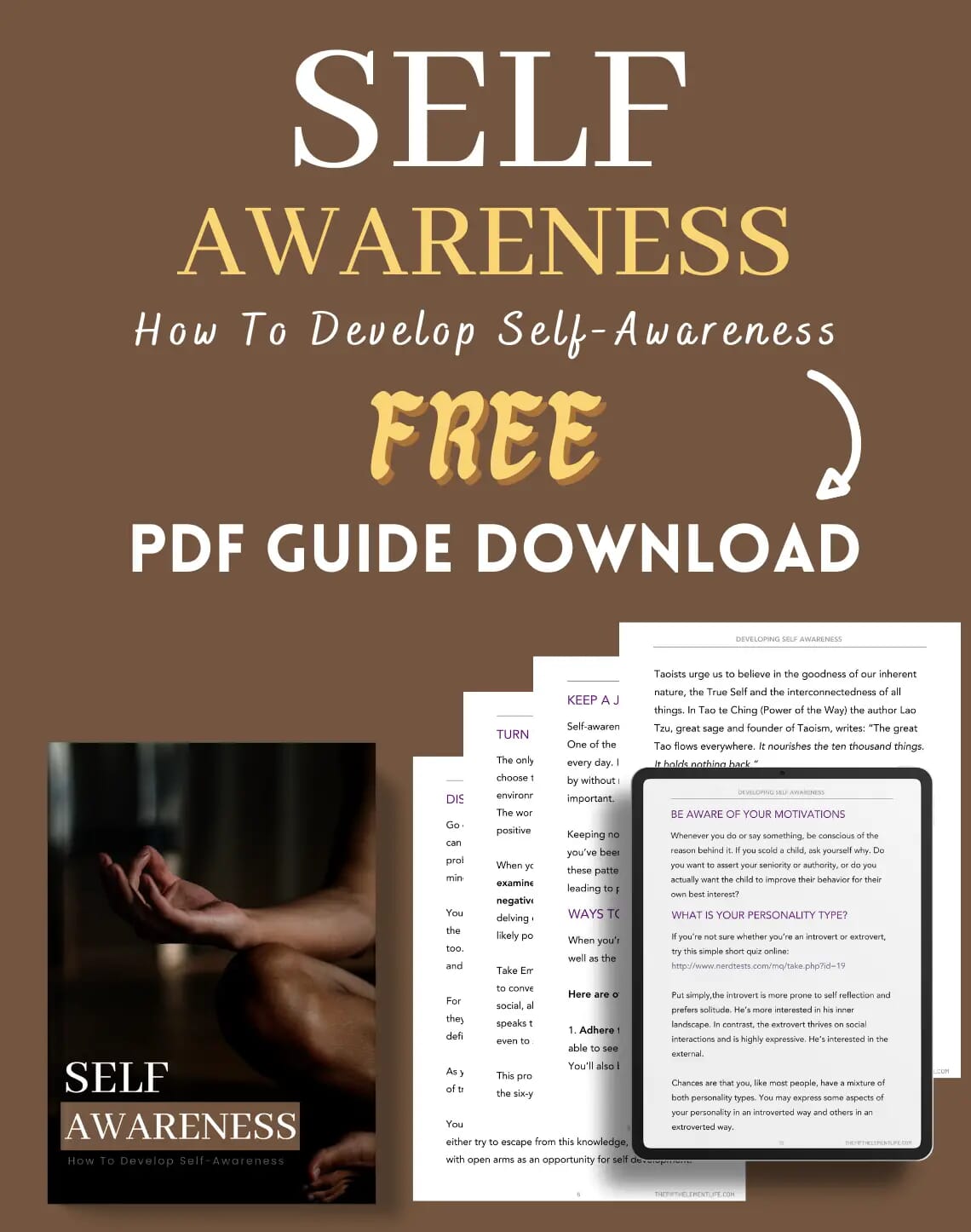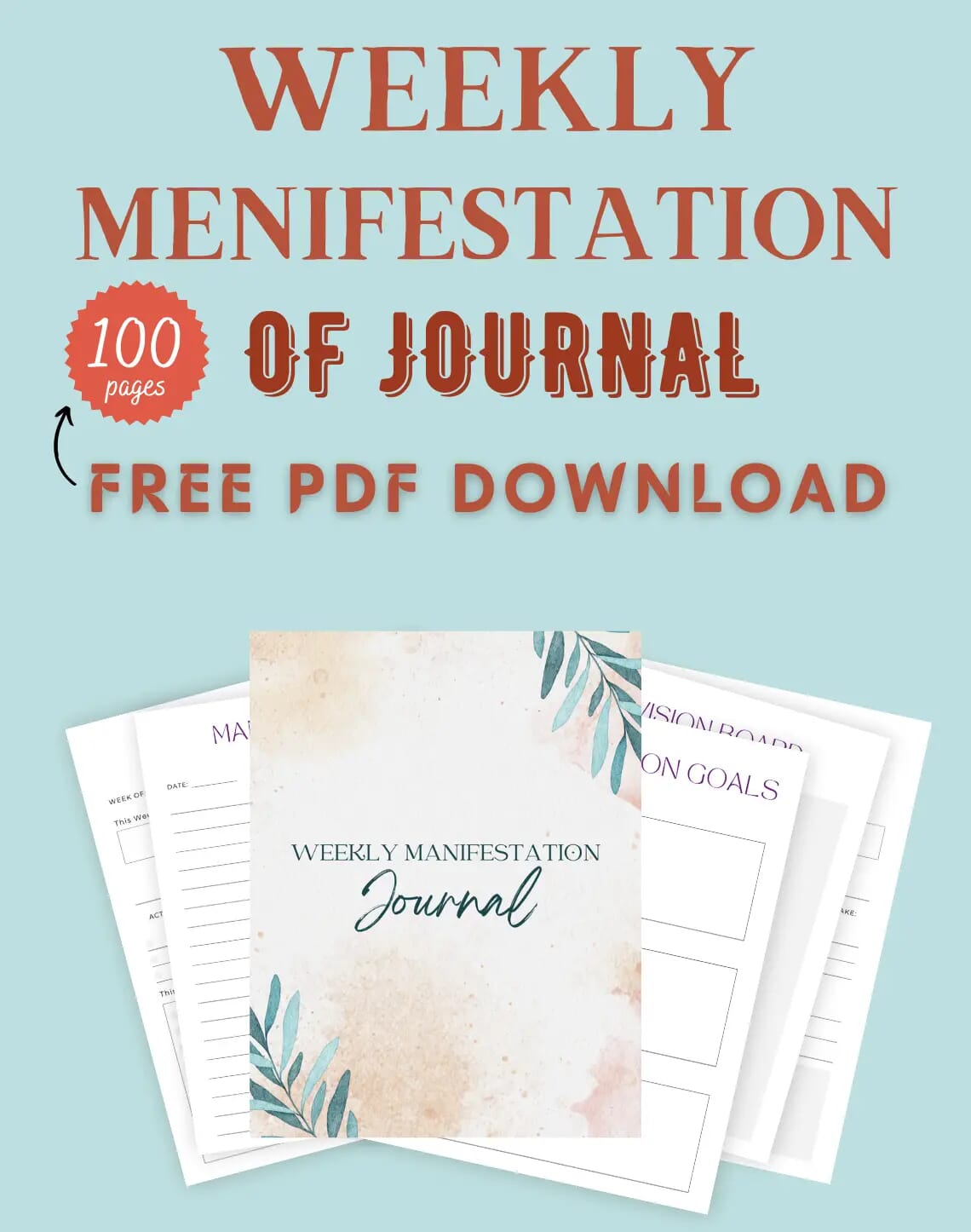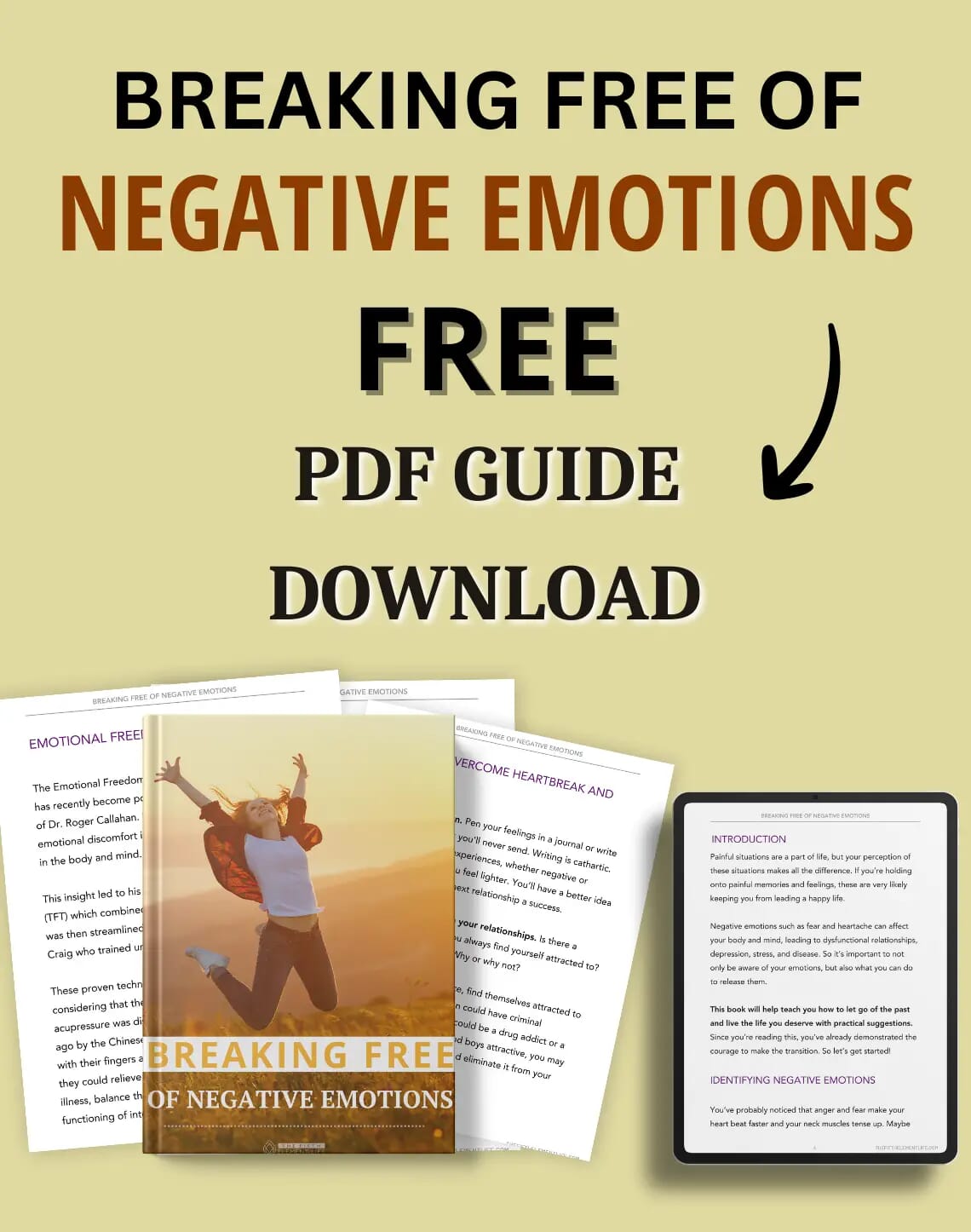Last Updated on May 26, 2023
As we grow older, we experience more and more of not only life’s hardships, but also life’s beautiful moments. To cultivate self awareness, the article covers different journaling tips to consider.
When I look back at some of my fondest and most difficult memories, something that has always been by my side is my journal.
From a young age, I have loved to write and because of this, I quickly channeled my proclivity for words into journaling.
No matter what I faced as I navigated life’s obstacles, there was never a time that my journal disappointed me.
And this is exactly why I want to encourage you to join me on this journey.
If you allow it, a journal can be an incredible tool for self-discovery, spiritual growth , and personal development.
In my experience, it has aided me in gaining clarity, perspective, and peace on my own path.
Whether it was a broken heart or simply a need to reflect and recharge, my journal always helped me to find my way.
In this article, I want to share with you 16 journaling tips that have helped me cultivate self-awareness, find my voice, and connect with my inner wisdom.
Whether you’re feeling lost, overwhelmed, or stuck, these tips can help you tap into your creativity, intuition, and inner strength.
We’ll start by exploring why journaling is so good for you, and then jump into practical techniques and strategies for making the most of your journaling practice.
We’ll also explore different types of journaling, use prompts, crystals, quotes, mandala coloring books, music, and more to help you find what resonates with you.
Whether you’re a beginner or a seasoned journaler, my hope is that these tips will inspire you to make journaling a regular part of your self-care routine, and help you discover your true self and find inner peace.
So grab your favorite journal and pen, and let’s dive in together!
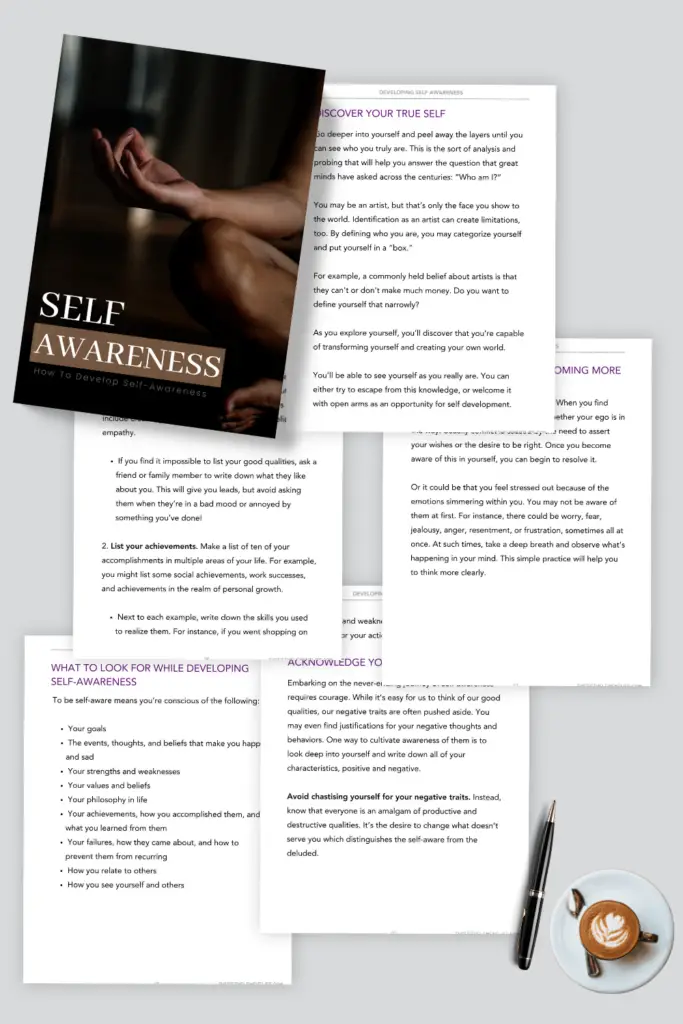
How Journaling Can Benefit You
As I mentioned, journaling is a powerful tool that can benefit you in many ways.
If you’re feeling skeptical, here are some of the reasons why journaling is good for you:
- Helps you process emotions: Journaling can be a powerful tool for processing emotions. When we put our thoughts and feelings onto paper, we gain distance from them and can view them more objectively. This can help us understand our emotional responses and gain insight into why we feel the way we do. Additionally, journaling provides a safe and private space for exploring our emotions. We can express ourselves freely without fear of judgment or criticism, allowing us to be more honest with ourselves and work through challenging emotions. As an emotional person, this has been hugely beneficial for me.
- Promotes self-reflection: Regular journaling can help us develop a habit of self-reflection. When we take the time to reflect on our thoughts and experiences, we can gain greater insight into our own patterns of behavior and thought processes. This self-awareness can help us identify areas for personal growth and develop strategies for addressing challenges in our lives. Additionally, self-reflection can help us develop a greater sense of compassion and understanding for ourselves and others.
- Boosts creativity: Journaling can be a great tool for boosting creativity. When we give ourselves permission to write freely and without judgment, we open ourselves up to new ideas and insights. Writing can help us explore our imaginations and come up with innovative solutions to problems. Additionally, journaling can help us tap into our intuition and connect with our inner selves, which can lead to greater creativity and inspiration.
- Encourages gratitude: Expressing gratitude is a key component of many spiritual practices, and journaling can help us cultivate a habit of gratitude in our daily lives. When we take the time to reflect on the things we are thankful for, we can develop a more positive outlook and deepen our sense of appreciation. Additionally, focusing on gratitude can help us shift our perspective and recognize the abundance in our lives, even during difficult times.
- Provides a record of personal growth: Over time, our journal can become a record of our personal growth and progress on our spiritual and self-help journey. When we look back on our past entries, we can recognize how far we’ve come and celebrate our achievements. Additionally, our journal can serve as a reminder of the lessons we’ve learned along the way, helping us stay focused on our goals and maintain our commitment to personal growth.
Journal Tips
Set Aside Dedicated Time
One of the most important journal tips for individuals on a spiritual journey is to set aside dedicated time for journaling.
While it may be tempting to squeeze in journaling whenever you have a spare moment, having a regular time set aside can help you establish a routine and make journaling a consistent practice in your life.
When choosing a time to journal, consider what works best for you.
I personally prefer to journal first thing in the morning, as it’s a great way to start the day with clarity and intention.
Many people, however prefer to journal at the end of the day, as a way to reflect on their experiences and process any emotions before bed.
Still others may find it helpful to journal during their lunch break or another specific time during the day.
Regardless of when you choose to journal, try to stick to a consistent schedule.
This can help you establish a habit and make journaling a regular part of your self-care routine.
It can also help you prioritize your own well-being and ensure that you have dedicated time for introspection and reflection.
If you’re new to journaling or struggling to make it a habit, try setting a reminder on your phone or calendar. This can help you remember to journal even on busy days or when you’re feeling uninspired.
It can also be helpful to create a dedicated space for journaling, such as a cozy nook in your home or a quiet spot in a nearby park. Having a comfortable and inviting space can make journaling feel more enjoyable and less like a chore.
Write Freely and Without Judgment
Although there was never a dull moment having grown up in a large household, having privacy was not always easy (I shared a bedroom with my sister until I was 14 and there was only one bathroom for 7 people- so you can imagine.)
This is perhaps one of the main reasons why I was so drawn to journaling.
Journaling is a personal and private practice where you can write freely and without judgment.
This means you can express your thoughts and feelings without worrying about grammar, spelling, or how your writing will be perceived.
When you sit down to journal, try to let go of any self-criticism or self-doubt. Remind yourself that there are no rules or expectations when it comes to journaling.
You can write in complete sentences, bullet points, or even just a stream of consciousness.
The goal is simply to get your thoughts and feelings onto paper in a way that feels authentic and meaningful to you.
If you find yourself getting stuck or feeling self-conscious about your writing, try setting a timer for a few minutes and writing without stopping until the timer goes off.
This can help you get into a flow state and bypass your inner critic.
Alternatively, you can try a journaling prompt or question to get your writing started.
Remember that your journal is a safe and private space for exploring your thoughts and feelings.
You don’t have to worry about anyone else reading your writing, and you don’t have to censor yourself or try to please anyone else.
Allow yourself to be vulnerable and honest in your writing, even if it feels uncomfortable at first.
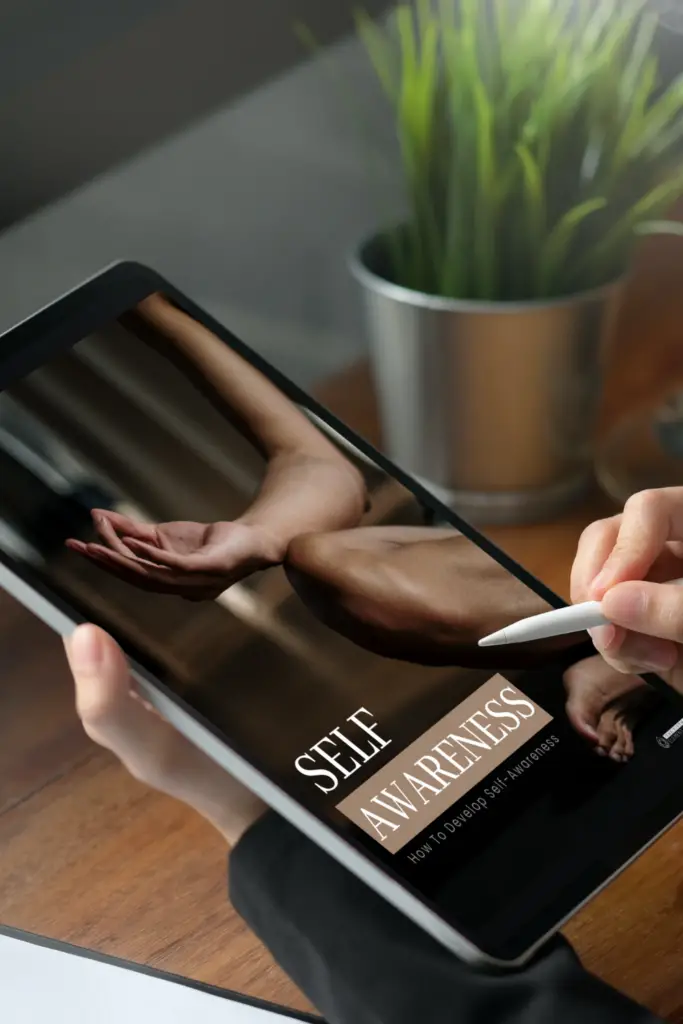
Use Your Journal to Set Intentions and Goals
I may be a shy individual, but I am also an ambitious one.
In my opinion, a significant part of living a fulfilling life in which you can feel a sense of accomplishment is having goals and actively working toward them- and journaling is a great way to keep track of these goals.
Whether you’re working towards a specific spiritual or personal development goal, or simply trying to cultivate more mindfulness and self-awareness in your life, your journal can be a valuable resource for staying on track and measuring your progress.
To use your journal for setting intentions and goals, start by identifying what you want to achieve.
This might be a specific behavior or habit you want to cultivate, a new perspective or attitude you want to adopt, or a larger life goal you’re working towards.
Write down your goal in your journal, along with any steps you need to take to achieve it.
As you work towards your goal, use your journal to track your progress and reflect on any challenges or obstacles you encounter.
Celebrate your successes and use setbacks as opportunities for learning and growth. Consider using prompts or questions to guide your reflection, such as:
- What progress have I made towards my goal today/this week/this month?
- What challenges or obstacles have I encountered? How can I overcome them?
- What have I learned about myself through this process?
- How can I adjust my approach to better align with my goals and intentions?
By using your journal to set intentions and goals and reflect on your progress, you can stay focused and motivated on your journey towards greater self-awareness and personal growth.
RELATED: 135 Gratitude Affirmations For Any Time, For Anyone
Practice Gratitude and Appreciation
Nowadays, with social media and the constant reminders that people are living seemingly amazing lives, it’s easy to get discouraged.
Is Rebecca really on holiday again while I’m stuck at this 9-5 office job?
The fact is, social media doesn’t reflect reality and if you simply take a good look around you, you will realize just how blessings are right in front of you.
Practicing gratitude and appreciation can be a powerful tool for cultivating a positive mindset and increasing your overall sense of well-being.
By focusing on the good things in your life, even amidst challenges and difficulties, you can shift your perspective and develop a deeper sense of gratitude for all that you have.
To practice gratitude and appreciation in your journal, take a few minutes each day to reflect on what you’re thankful for.
Write down anything that comes to mind, whether it’s something big or small. It could be a supportive friend, a good meal, a beautiful sunset, or even just a moment of peace and quiet.
You can also try incorporating gratitude into your journal prompts or questions. For example:
- What am I thankful for today?
- What positive experiences have I had recently?
- Who has helped me or made a positive impact in my life?
- What personal strengths or qualities am I grateful for?
By making gratitude and appreciation a regular part of your journaling practice, you can shift your focus towards the positive aspects of your life and cultivate a greater sense of joy and contentment.

Use Your Journal for Self-Reflection and Self-Discovery
I’m the queen of psychoanalyzing myself, so instead of spending every night overthinking for hours, I turn to my journal for a healthier session of introspection.
Journaling can also be a powerful tool for self-reflection and self-discovery.
By taking the time to reflect on your thoughts, feelings, and experiences, you can gain deeper insight into yourself and your motivations.
When I began practicing this form of journaling, for example, I quickly became aware of where my anxiety stems from and was then able to address it productively.
To use your journal for self-reflection and self-discovery, start by setting aside some dedicated time for writing.
Find a quiet and comfortable space where you can focus without distractions. Consider using prompts or questions to guide your reflection, such as:
- What am I feeling right now?
- What are my priorities and values?
- What challenges or obstacles am I facing?
- What are my strengths and weaknesses?
As you write, allow yourself to be honest and vulnerable.
Don’t worry about grammar or spelling, and don’t judge yourself for any negative thoughts or feelings that come up.
Your journal is a safe space for you to explore your innermost thoughts and feelings.
By regularly reflecting on your thoughts, feelings, and experiences in your journal, you can gain a greater understanding of yourself and your needs.
This can help you make more intentional choices and live a more authentic and fulfilling life.
Use Your Journal for Mindfulness Practice
Because of my constant anxiety and worrying about the future, it took me a long time to learn how to truly live in the present.
Enjoying the current moment is essential for your happiness, which is why it is so important to be mindful.
Mindfulness is the practice of being present and fully engaged in the current moment, without judgment or distraction.
Journaling can be a powerful tool for cultivating mindfulness and increasing your overall sense of well-being.
To use your journal for mindfulness practice, start by setting aside some dedicated time each day for writing.
Find a quiet and comfortable space where you can focus without distractions.
Begin by taking a few deep breaths and centering yourself in the present moment.
As you write, focus on the physical sensations of the pen or pencil in your hand, the texture of the paper, and the sound of the words forming on the page.
Notice any thoughts or feelings that arise, but try not to judge or attach to them. Simply observe them and let them pass.
You can also use prompts or questions to guide your mindfulness practice, such as:
- What physical sensations am I experiencing right now?
- What emotions am I feeling?
- What thoughts are coming up for me?
- What am I grateful for in this moment?
By using your journal for mindfulness practice, you can develop a greater sense of presence and awareness in your daily life.
This can help you cultivate a more positive mindset, reduce stress and anxiety, and improve your overall sense of well-being.
RELATED: 129 Inspiring Affirmations To Cultivate Gratitude Daily
Use Prompts to Spark Creativity and Insight
Sometimes, it can be challenging to know what to write about in your journal (after years of journaling, I often lack inspiration).
That’s where prompts can be a helpful tool.
Prompts are prompts or questions that can help you generate ideas, spark creativity, and gain insight into your thoughts and feelings.
Prompts can take many different forms, from simple questions to more complex exercises. Some examples of journal prompts include:
- What am I grateful for today?
- What are three things I’m proud of myself for?
- Write about a time when you overcame a significant challenge.
- If you could have a conversation with any person, living or dead, who would it be and why?
- Write a letter to your future self.
When using prompts in your journal, it’s important to allow yourself the freedom to explore your thoughts and feelings without judgment.
Write whatever comes to mind, even if it doesn’t make sense or seems random. You may be surprised at the insights you uncover!
Using prompts can be a helpful tool for breaking through writer’s block, generating new ideas, and gaining clarity on your thoughts and feelings.
Consider experimenting with different types of prompts to find what works best for you.
Use Crystals to Enhance Your Journaling Practice
If you’re looking to explore the spiritual world more deeply, I highly recommend giving crystals a try.
Crystals have been used for centuries for their healing properties and can be a powerful tool for individuals on a self-help journey.
Adding crystals to your journaling practice can help you cultivate intention and focus, and enhance your overall experience.
There are many different crystals you can use to enhance your journaling practice, each with its unique properties and benefits.
Some examples include:
- Amethyst: Promotes relaxation, clarity, and intuition- I use this one to help with my stress and anxiety.
- Rose Quartz: Encourages self-love and compassion.
- Clear Quartz: Amplifies energy and promotes focus and clarity.
- Citrine: Encourages abundance and prosperity.
To use crystals in your journaling practice, start by selecting a crystal that resonates with your intentions and goals.
Hold the crystal in your hand as you journal, and set an intention for your practice. You can also place the crystal on your journal or altar as a reminder of your intention.
As you journal, take breaks to hold the crystal and connect with its energy.
Reflect on how the crystal is supporting your intentions and goals and how you can incorporate its properties into your daily life.
Use Quotes and Affirmations to Inspire Your Writing
As a person with an entire Pinterest board dedicated to inspirational quotes and affirmations, there is no lack of the former nor the latter in my journaling.
Quotes and affirmations are a great way to help you cultivate inspiration, motivation, and positivity in your journaling practice.
Incorporating quotes and affirmations into your writing can help you gain new perspectives, cultivate self-awareness, and connect with your inner wisdom.
When selecting quotes and affirmations for your journaling practice, choose ones that resonate with your current intentions and goals.
You can find inspiration from books, podcasts, social media, or even create your own affirmations.
Here are some examples of quotes and affirmations you can use in your journaling practice:
- “The only way to do great work is to love what you do.” – Steve Jobs
- “I am worthy of love and respect.”
- “Today, I choose happiness and abundance.”
- “I am capable of achieving my dreams and goals.”
When using quotes and affirmations in your journaling practice, take time to reflect on what they mean to you and how they relate to your current experiences and emotions.
You can also use them as writing prompts by expanding on why they resonate with you and how they can be applied to your life.
RELATED: 447 Beautiful Thankful Quotes To Express Gratitude And Appreciation
Incorporate Mandala Coloring Books into Your Journaling Practice
If you love a creative project and would like to add a little artistic flare to accompany your writing, then mandala coloring books are just what you need.
Mandala coloring books are a popular tool for mindfulness, relaxation, and stress relief.
Incorporating these coloring books into your journaling practice can help you connect with your inner self and enhance your creativity.
When using mandala coloring books in your journaling practice, set an intention for your practice and choose a mandala that resonates with your intention.
Before you start coloring, take a few deep breaths and focus on your intention.
As you color, allow yourself to be present in the moment and let your mind wander.
You may find that coloring helps you access deeper levels of creativity and self-awareness.
You can also use the colors and patterns in the mandala as inspiration for your writing by reflecting on what they represent to you and how they relate to your current experiences and emotions.
Incorporating mandala coloring books into your journaling practice can also be a form of self-care.
It provides an opportunity to slow down and disconnect from the outside world, allowing you to recharge and refocus your energy.

Be Honest with Yourself
Reflecting on yourself and unveiling thoughts and emotions that were buried deep is not easy.
Trust me, I know.
But the only way to truly heal in this life is by acknowledging our feelings and actively processing them in healthy ways.
This is why one of the most important aspects of journaling is honesty.
While being honest is challenging, it is also a crucial step in gaining self-awareness and developing a deeper connection with yourself.
When writing in your journal, allow yourself to express your true feelings, even if they are uncomfortable or difficult to face.
Don’t worry about judgment or criticism; your journal is a safe space for you to be honest and vulnerable.
Honesty in your writing can also help you identify patterns in your behavior and thought processes, allowing you to make positive changes and cultivate healthier habits.
It can also help you let go of negative emotions and release emotional blocks, leading to greater emotional freedom and clarity.
Remember that being honest with yourself is not about being perfect or having all the answers.
It’s about acknowledging and accepting your thoughts, emotions, and experiences, even the ones that are challenging or uncomfortable.
I never would have been where I am today if I didn’t have the courage to see myself in full transparency.
It’s hard, but if I can do it, so can you.
Let Go of Expectations
Many people start journaling with specific goals in mind, such as finding answers to a problem or discovering their life purpose.
When I first started, I thought I would instantly find all of the answers.
While these are admirable goals, it’s important to remember that journaling is not a one-size-fits-all solution, and everyone’s journey is unique.
Instead of approaching journaling with expectations, try to approach it with an open mind and a sense of curiosity.
Allow yourself to explore your thoughts and emotions without judgment, and trust that the process will lead you where you need to go.
Remember that journaling is not about perfection or having all the answers.
It’s about giving yourself permission to be vulnerable, express yourself, and explore your inner world.
Be kind to yourself and trust the process, knowing that every step forward is a step closer to greater self-awareness and personal growth.
Get Creative
Journaling doesn’t have to be limited to writing down your thoughts and feelings in a traditional way.
In fact, getting creative can add a new dimension to your journaling practice and help you access different parts of yourself.
As a person who loves to scrapbook, I frequently participate in artistic journaling.
And there are many ways to get creative with writing.
You could try drawing or sketching, painting, collaging, using stickers, or incorporating other art supplies like washi tape or markers.
You could also try creating a vision board or using imagery to represent your thoughts and feelings.
By incorporating creativity into your journaling practice, you can access your subconscious mind and gain deeper insights into your thoughts, emotions, and experiences.
It can also be a fun and therapeutic way to explore and express yourself.
Remember that there are no rules when it comes to creative journaling. It’s about giving yourself permission to experiment and explore without judgment or pressure.
Allow yourself to play and have fun, knowing that every creation is a reflection of your unique self.
Use Music
When I was younger, my mom always used to play classical music in the car and let me tell you, it drove me crazy (no pun intended).
Ironically, as an adult, I love classical music- especially when I’m about to journal.
Music is a powerful tool for self-exploration and self-expression, and incorporating it into your journaling practice can enhance your experience and deepen your insights.
Whether you’re into folk or heavy metal, here are a few ways to use music in your journaling practice:
- Choose a theme song: Select a song that resonates with you or reflects your current mood, and use it as a starting point for your journaling. Listen to the song and reflect on its lyrics, melody, and energy, then use it as inspiration for your writing.
- Create a playlist: Compile a playlist of songs that inspire you or reflect your current state of mind. Use this playlist as a backdrop for your journaling sessions, and allow the music to guide and inspire your writing.
- Write your own lyrics: If you’re feeling creative, try writing your own song lyrics as a way to express your thoughts and emotions. You don’t have to be a musician to do this – just write from the heart and let the words flow.
- Use music as a meditation tool: If you find it difficult to quiet your mind and focus during your journaling practice, try using music as a meditation tool. Choose a calming instrumental track or a guided meditation with music, and use it to help you relax and tune into your inner world.
Make It a Habit
Journaling can be a powerful tool for personal growth and self-awareness, but like any practice, it requires consistency and dedication to truly reap the benefits.
That’s why making journaling a habit is an important tip for individuals on a spiritual and self-help journey.
Try to establish a regular journaling routine that works for you.
To get the most out of it, I try to journal on a daily basis. This, however, is obviously not realistic for everyone.
Whether it’s weekly, or even monthly, find a time that fits your schedule and preferences.
Set aside a specific time and place for your journaling practice, and treat it as a non-negotiable appointment with yourself.
Making journaling a habit can also help you stay accountable to your goals and intentions.
Use your journal to track your progress, set intentions, and reflect on your successes and challenges.
By incorporating journaling into your regular routine, you’ll be more likely to stay on track and see the results you’re looking for.
Remember that journaling is a personal practice, so don’t compare yourself to others or feel pressured to meet certain expectations.
It’s about connecting with yourself and exploring your inner world, so focus on what feels authentic and meaningful to you.
Enjoy the Process
Sometimes my ambitious mind can take over and I start to lose perspective.
But it’s important to remember that journaling is a journey, not a destination.
It’s a process of self-discovery and self-exploration that can be both challenging and rewarding.
It’s important to approach journaling with a sense of curiosity and openness, and to enjoy the process rather than focusing solely on the end result.
Here are a few tips for enjoying the journaling process:
RELATED: 77 Inspiring Wednesday Blessings To Cultivate Gratitude
- Let go of perfectionism: Journaling is not about creating a perfect piece of writing. It’s about expressing yourself honestly and authentically. Let go of any expectations you have for your writing, and allow yourself to write freely and without judgment.
- Embrace the messiness: Writing can be messy, both physically and emotionally. Embrace the messiness of the process, whether it’s the scribbles and crossed-out words on the page or the raw and sometimes uncomfortable emotions that come up during your writing.
- Celebrate your progress: Celebrate your progress, no matter how small. Whether you’ve written consistently for a week or uncovered a new insight about yourself, take time to acknowledge and celebrate your achievements.
- Have fun: Journaling can be a fun and creative outlet. Experiment with different prompts, writing styles, and tools, and allow yourself to play and have fun with your writing.
Remember that journaling is a personal and unique process, and there is no right or wrong way to do it.
Embrace your own style and approach, and allow yourself to enjoy the journey of self-discovery and self-exploration.
Types Of Journals
Journaling is a versatile and effective tool that can be approached in many different ways.
Depending on your interests and goals, you may find that certain types of journaling resonate with you more than others.
In this final section, we’ll explore some of the most common types of journaling to help you find the right approach for your own journey of self-discovery.
- Personal journaling: This is the most common type of journaling, where you write about your personal experiences, thoughts, and feelings.
- Gratitude journaling: This involves writing down things you’re grateful for, which can help cultivate a more positive and grateful mindset.
- Dream journaling: This involves recording your dreams as soon as you wake up, which can help you better understand your subconscious mind.
- Travel journaling: This involves documenting your travels, including the places you visit, the people you meet, and the experiences you have.
- Art journaling: This involves combining writing and art to express yourself creatively. You can use various art materials such as paint, markers, and collage to create visual representations of your thoughts and feelings.
- Bullet journaling: This is a popular method of journaling that involves creating an organized system for tracking your tasks, events, and goals.
- Spiritual journaling: This involves exploring your spirituality and reflecting on your beliefs, values, and experiences related to your spiritual practice.
- Food journaling: This involves keeping track of what you eat and drink, which can help you develop healthier eating habits and identify any patterns or triggers related to your diet.
- Career journaling: This involves reflecting on your career goals, accomplishments, and challenges, and exploring ways to grow and develop professionally.
- Mental health journaling: This involves tracking your moods, emotions, and mental health symptoms, and exploring ways to improve your mental health and wellbeing.
There are many more ways to approach journaling, so feel free to experiment and find what works best for you!
Frequent Asked Questions
What is the basic rule of journal?
The basic rule of journaling is to regularly document your thoughts, experiences, and observations in a personal and reflective manner. It is a practice of self-expression, self-discovery, and personal growth, without strict rules or limitations. The key is to make it your own and use it as a tool for reflection, understanding, and development.
What can I write in my diary?
In your diary, you can write about a wide range of topics and experiences. Here are some ideas:
Daily Events: Capture the details of your day, including activities, interactions, and significant moments. Write about what happened, who you met, and how you felt.
Thoughts and Emotions: Express your thoughts, feelings, and emotions about various aspects of your life. Reflect on your hopes, dreams, fears, and aspirations. Explore your inner world and delve into your thoughts on different subjects.
Gratitude: Write about things you are grateful for, whether big or small. Express appreciation for people, experiences, achievements, or even the simple joys of life. Focusing on gratitude can cultivate a positive mindset.
What are the 3 golden rules?
While there are no hard and fast rules for journaling, here are three guiding principles that can enhance your journaling practice:
Consistency: Establish a regular journaling routine. Consistency helps make journaling a habit and allows you to reap its benefits over time. Whether it’s daily, weekly, or a schedule that works for you, commit to regularly setting aside time for journaling.
Honesty: Be authentic and honest with yourself in your journal. Use your journal as a safe space to express your true thoughts, feelings, and emotions without judgment. Allow yourself to explore your innermost thoughts and reflect on your experiences openly.
Non-Judgment: Practice non-judgment when journaling. Avoid critiquing or censoring your thoughts. Instead, create an atmosphere of acceptance and curiosity. Embrace your journal as a judgment-free zone where you can freely explore ideas, emotions, and experiences.
Continue Reading 👉 : 124 Inspiring Show Up For Yourself Quotes
- 49 Unique Self-Care Kit Ideas For Your Well-Being - February 14, 2024
- 85 Exciting And Encouraging Quotes About Trying New Things In Life To Inspire That First Step - February 14, 2024
- 125 Inspiring You Are Amazing Quotes For Yourself And The Special People In Your Life - February 14, 2024

